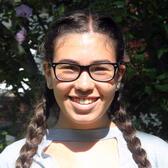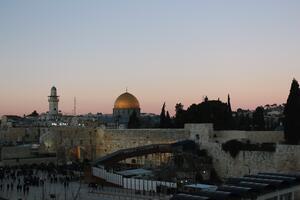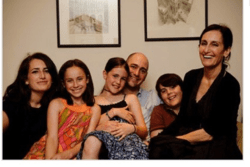When Identities Meet
The first moment it hit me that Israel was my new reality—that I would be spending the next four months with these sixty teens as part of the NFTY EIE program—was our first Shabbat together. We went to the Kotel, first to the egalitarian section for a quintessential Reform service—guitars, hand movements, etc...The familiar service made the people whom I had met less than a week earlier feel like family.
Then we walked to the main section together, and were almost immediately split up. The security lines had signs that read נשים (women) and גברים (men). Security guards patted us down—poked and prodded to make sure we weren’t carrying anything dangerous. When we got inside, our counselors told us to meet under the flagpole in an hour, and then gave us free reign.
I approached the wall, the sounds of singing and prayer to my left (the men’s side) in stark contrast to the near silence to my right (the women’s side). There were two teenage girls next to me standing on stools and peering across the barrier, looking longingly at the dancing circles of men. I tried to ignore my increasing discomfort about the gender divide and focus on the fact that I was, arguably, in the holiest place on earth for the Jewish people.
When I finally reached the wall, I placed my hand on it, and everything around me disappeared. I ran my fingers over the notes in the cracks of the wall, overcome with emotion. Each tiny paper was packed with hopes and dreams. Hundreds of people come here every day; each regarding this wall with individual significance. The power of this was not lost on me, and, in that moment, I felt more connected to my Judaism than ever before. I placed my forehead on the cool rock and closed my eyes, a small smile on my face.
Minutes passed, I opened my eyes, and my surroundings returned: the sound of the men singing and dancing, the sight of the two young girls on their tiptoes, the eerie silence on the women’s side. The weight returned to my shoulders. My stomach clenched. I walked back to the flagpole in a daze, slightly bewildered by the mix of emotions I had just experienced.
That night, back at my room, I stared at the ceiling and tried to sort everything out. I felt a shift in my views, but I couldn’t articulate what that meant. After a few minutes, I turned to Melissa and Tovia, my roommates.
“I’m angry, and frustrated,” I said. “But I’m also so spiritually fulfilled. I don’t know how to feel.” I didn’t need to say anything else; they immediately knew what I was talking about.
As a clergy kid from a town that is nearly 50% Jewish, I have always been comfortable with my spiritual identity. I’m always happiest at my camp’s guitar-filled services, and I have always considered myself “Jewish first.” I went to Israel completely at ease with my relationship to religion, only to have my world turned upside down at the wall. It was extremely difficult for me to confront the fact that the feminist and Jewish values that I have always considered one and the same were so starkly at odds.
Since that night, my comfort in questioning the world around me has increased. This moment of discomfort coupled with true spiritual awakening helped me realize that it’s wholly possible to support an institution while also questioning it. No matter how strongly you believe in something, it’s important to resist blindly following it. Rather, it’s important to constantly and consciously question and re-assess our views, in order to grow both personally and spiritually. This experience didn’t make me any less Jewish, nor any less feminist, but rather strengthened my connections to both identities. I now have a better understanding of who I am through both of those lenses, as well as how they intersect.
This piece was written as part of JWA’s Rising Voices Fellowship.








You are so talented wow I'm so proud
So well thought out and written. You have spoken for so many woman that cannot put those thoughts into words. I am so proud of you ( always) and all that you have seen, thought about and accomplished.
ישר כח.
Couldn't be prouder
Always have been proud of you, but your words couldn't make your feminist Reform Jewish Savta any prouder.
Rachel - great article and you have captured what a lot of women feel.
youre incredible
amazing
okay rach I see you
So good!!!